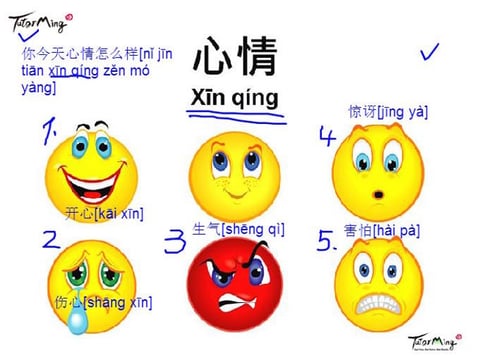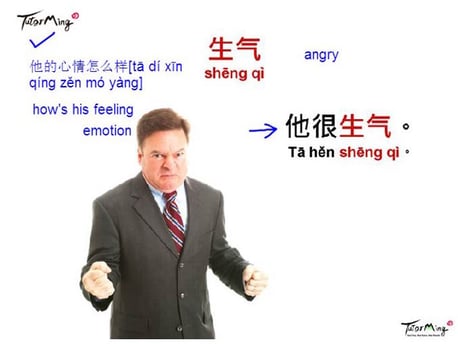My name is Efrain, and this is my weekly column on my journey to becoming fluent in Chinese with TutorABC Chinese. You can check out why I want to learn Chinese in my introduction here.
I learned a long time ago that it's impossible to learn Chinese just by memorizing flashcards. It’s not enough just to learn new vocabulary words – you have to learn new sentence structures too.
This week, my class started with an introduction to different expressions. The instructor taught me how to ask “how are you doing?” I knew some basic responses such as "I’m very good (我很好)", but of course that’s not always going to get me by. Although the topic of this lesson was on feelings, the difficult part for me was learning a different way to form a question.
New Sentence: 你今天心情怎么样?
The sentence I learned to ask was, "你今天心情怎么样? (nǐ jīn tiān xīn qíng zěn me yàng)." This means, "How are you feeling today?" This phrase was hard for me because in English it directly translates to, “you today mood how?" This was a very different structure from what I'm used to as a native English speaker. As a beginner, I got by using 你好吗 (nǐ hǎo ma).
The main way I know how to phrase a question in Chinese is using "什么 (shén me)." This means "what?" If I say this to someone while they are talking, they'll know to repeat themselves. The second way I know how to ask a question in Chinese is using the word "吗 (ma)" at the end of a sentence. This is a question marker.
So I was very surprised to learn that the question "你今天心情怎么样 (nǐ jīn tiān xīn qíng zěn me yàng) had neither "什么" nor "吗." I asked my teacher why, and she said that "什么" would be incorrect in this case. You wouldn't ask someone, "What your feeling?" Instead, you would ask them "How are you feeling?" I learned that"怎么 (zěn me)" means "how" in Chinese.
If you're happy and you know it say 开心!

In the next part of the lesson, the teacher taught me some new vocabulary words that have to do with emotions. To test my knowledge, she showed me a series of pictures and asked me "他的心情怎么样 (tā de xīn qíng zěn me yàng)." Most of the images were of people at work, which I thought was funny; I for one have definitely experienced lots of different emotions at work. (For example, I'm usually very happy when I get to leave.) One of the pictures looked like an angry boss, so I responded "他很生气 (tā hěn shēng qì.)"

Here, I noticed that instead of saying "He is mad", in Chinese we literally say, "He very mad." The instructor took a while explaining this to me, which I will not delve into here. Things are described differently in Chinese? Here's a great article that explains using "很 (hěn)" with adjectives.
This lesson was very important to me and my journey. People express themselves differently, whether it's with emotions or language. At the end of the day, the reason I'm learning Chinese is to understand others, and in turn, be understood.
That's it for today! Tune in to my column next week to see what new things I learn!
Related: Learn Chinese With Efrain - Week 1: "Travel Vocabulary?"
Sentence Structure Review
你今天心情怎么样? (nǐ jīn tiān xīn qíng zěn me yàng
Translation: How are feeling today?
他很生气 (他很生气 (tā hěn shēng qì)
Translation: He is mad.
Vocabulary List
|
你今天心情怎么样
|
nǐ jīn tiān xīn qíng zěn me yang
|
How are you feeling today?
|
|
他的
|
Tā De
|
He
|
|
她的
|
Tā De
|
Her
|
|
心情
|
xīn qíng
|
mood
|
|
生气
|
shēng qì
|
mad
|
|
开心
|
kāi xīn
|
happy
|
|
紧张
|
jǐn zhāng
|
nervous
|
|
伤心
|
shāng xīn
|
sad
|
|
累
|
lèi
|
tired
|
|
惊讶
|
jīng yà
|
surprised
|
|
害怕
|
hài pà
|
scared
|
|
害羞
|
hài xiū
|
shy
|
|
无聊
|
wú liáo
|
bored
|
|
你好吗
|
Nǐ hǎo ma
|
"How are you?"
|
Like this post? Join uS to learn more!
